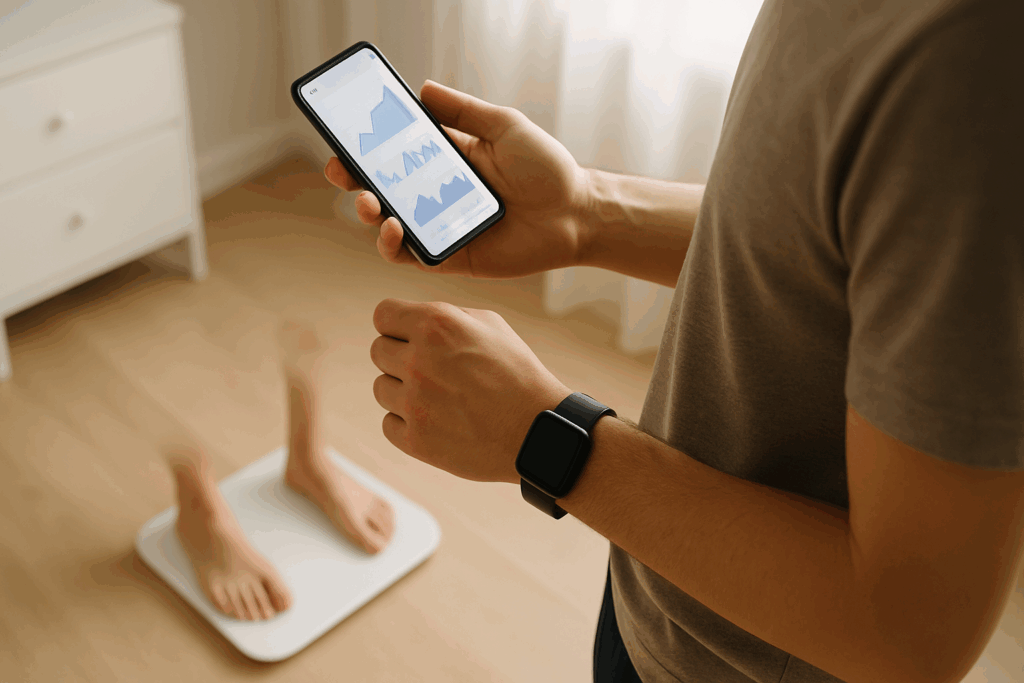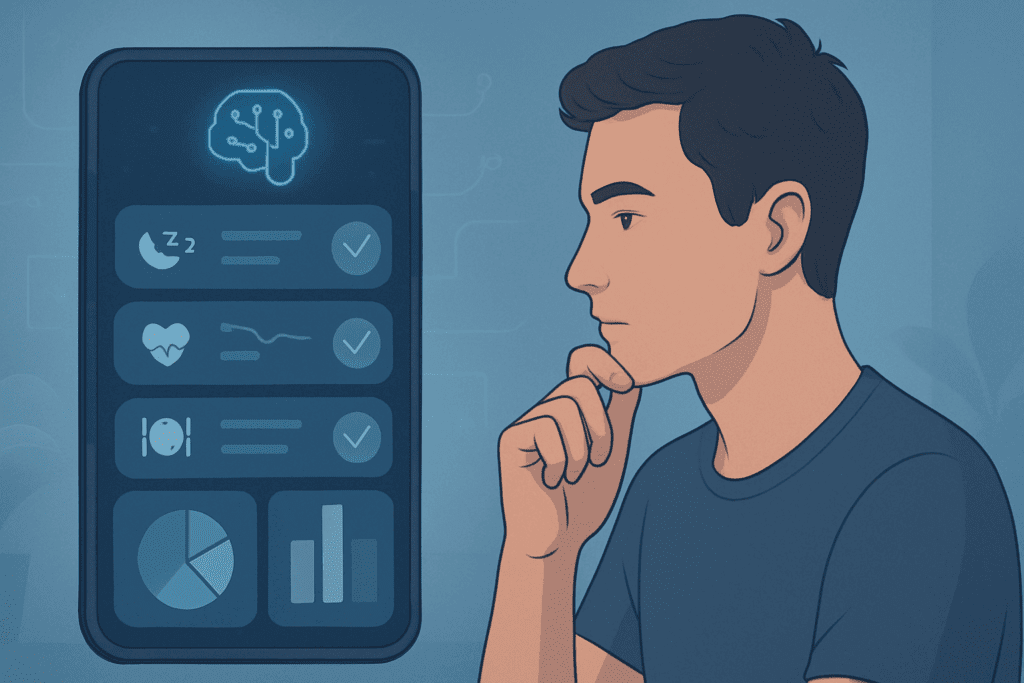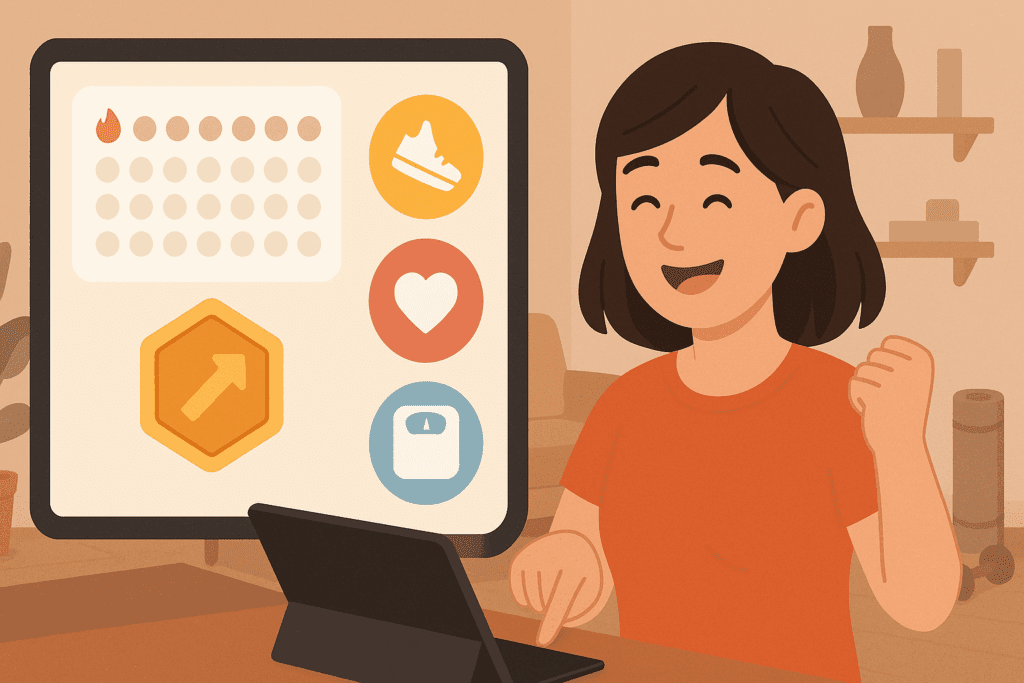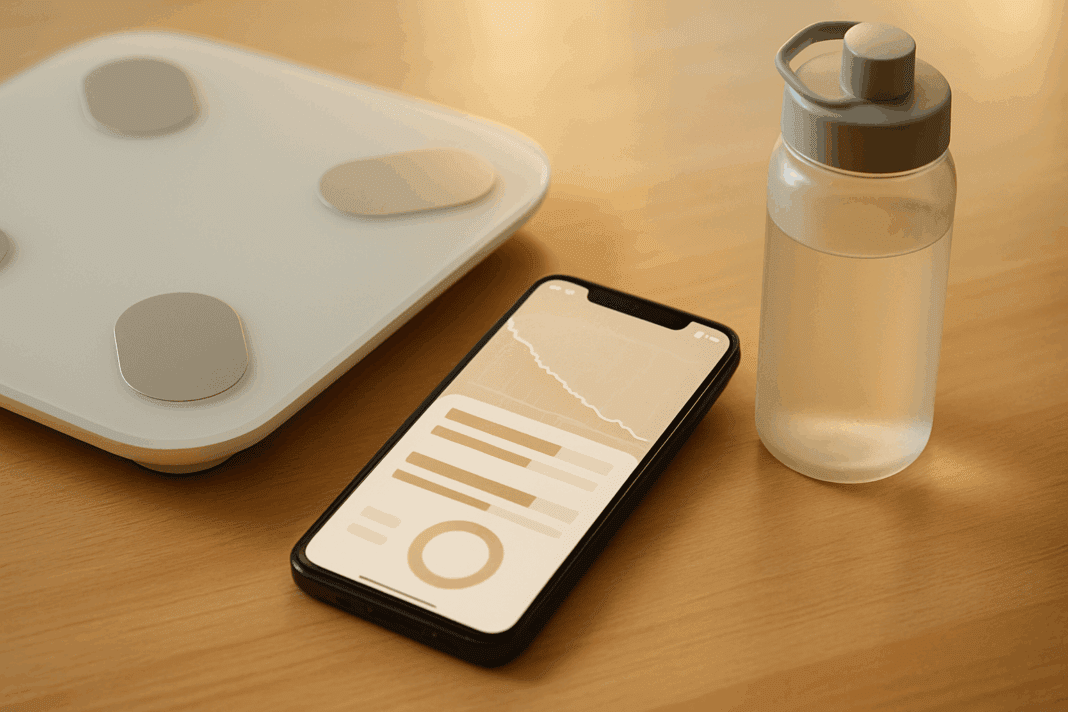In a world increasingly reliant on digital health tools, the concept of tracking one’s weight with precision, consistency, and purpose has gained traction among healthcare professionals and wellness enthusiasts alike. The rise of the weight tracker app represents more than just a technological convenience; it embodies a transformative shift in how individuals engage with their weight loss journeys, empowering them with data-driven insights, motivation, and accountability. This article delves into the role of weight tracking technology in long-term weight management, supported by expert recommendations, behavioral science, and practical strategies for achieving and maintaining wellness.
You may also like: Expert-Backed Weight Loss Tips for a Healthier Lifestyle: What You Need to Know for Long-Term Weight Control and Wellness

Understanding the Role of Digital Weight Trackers in Modern Health Management
Modern healthcare has witnessed a significant transition from passive data collection to real-time, interactive health monitoring. Among the most accessible tools in this evolution is the weight tracker app, which allows users to log daily weigh-ins, monitor trends, set goals, and track progress. These apps offer more than just number tracking; they integrate behavioral psychology, personalized feedback, and data visualization to help users better understand the relationship between their actions and outcomes.
Digital weight tracking is particularly useful because it translates abstract health goals into tangible metrics. The act of logging one’s weight consistently cultivates self-awareness and reinforces behavioral change. Research has shown that individuals who use a weight loss tracker regularly are more likely to lose weight and maintain their progress over time. The weight app becomes a reflective mirror of one’s habits, both positive and negative, fostering a deeper connection to health goals.
Moreover, weight apps often sync with wearable fitness devices, nutrition databases, and physical activity logs, offering a comprehensive overview of lifestyle choices. This integrated approach gives users actionable insights that are both specific and holistic. Instead of isolating weight as a single metric, a good weight tracker connects it to sleep, hydration, exercise, and nutrition patterns, giving a fuller picture of what contributes to weight fluctuations.

The Science Behind Tracking and Behavior Change
One of the core reasons weight tracker apps are so effective lies in their alignment with behavioral science principles. Self-monitoring is a foundational component of behavior change, particularly in cognitive-behavioral therapy (CBT) for weight management. By recording daily weigh-ins, users become more attuned to the consequences of their choices and more mindful of daily decisions related to food intake, physical activity, and other health behaviors.
The process of weighing in and tracking serves as a cue for self-reflection, allowing users to evaluate not just what they weigh, but why they weigh what they do. Was the gain due to sodium retention, a celebratory dinner, or a missed workout? This analysis transforms passive weight logging into an active process of health awareness and learning.
Weight loss tracker apps often include features like trend analysis, progress charts, and milestone tracking, all of which enhance intrinsic motivation. Instead of obsessing over daily fluctuations, users can focus on long-term trends, gaining encouragement from gradual improvement. These visual reinforcements make progress feel tangible, reducing the likelihood of discouragement and helping users stay on course.
From a neuropsychological perspective, goal-setting within a weight app activates reward pathways in the brain. The completion of small goals, such as logging meals or achieving a step target, releases dopamine, a neurotransmitter associated with pleasure and motivation. This creates a feedback loop in which healthy behaviors are not just practiced but reinforced emotionally.

Personalized Support and Smart Feedback Systems
What distinguishes a modern weight tracker app from older pen-and-paper methods is its capacity for personalization. Many weight loss tracker platforms use machine learning algorithms to offer tailored feedback based on user data. This could include alerts about weight plateaus, encouragement messages after milestones, or even gentle nudges to step on the scale after missed weigh-in days.
Personalization is vital for engagement. Generic advice often fails to resonate, but when a weight app delivers insights based on individual trends, the recommendations feel relevant and actionable. For instance, if a user tends to gain weight after skipping breakfast, the app might suggest adding a balanced morning meal to stabilize energy levels and reduce overeating later in the day. This intelligent support mimics the guidance of a personal coach, making the app feel more like a partner than a tool.
Additionally, weigh in tracker apps often allow users to input emotional states, hunger cues, and sleep quality, offering correlations that enhance self-understanding. This kind of journaling promotes emotional intelligence in the context of weight management, helping users recognize triggers, cope with setbacks, and avoid self-sabotaging patterns.

Enhancing Accountability and Motivation with Digital Tools
Consistency is one of the most elusive elements of long-term weight loss. Weight loss tracker apps address this challenge by promoting accountability through reminders, streaks, and peer support communities. Some apps allow users to share their progress with friends, fitness coaches, or support groups, creating a social dimension that adds encouragement and accountability.
Digital reminders to weigh in or log meals help users stay consistent, especially during stressful or busy periods. When healthy habits are automated or embedded into daily routines, they become sustainable. Over time, the app’s role shifts from being a novelty to becoming a trusted part of a user’s wellness toolkit.
Moreover, gamification elements such as badges, challenges, and progress bars add an element of fun and motivation. When users receive rewards for consistent logging or goal achievement, the process feels more like a journey of self-improvement than a restrictive diet plan. These psychological incentives keep users engaged, especially during plateaus or setbacks, where motivation might otherwise wane.
Integration with Broader Health and Wellness Goals
Weight is only one dimension of wellness, and the most effective weight tracker apps understand this nuance. Many now offer integration with broader health metrics, including blood pressure, glucose levels, menstrual cycles, and mental well-being. By creating a central hub for health data, these apps allow users to see how their weight interacts with other aspects of health.
For individuals managing chronic conditions like hypertension, prediabetes, or PCOS, weight tracking can be instrumental in managing symptoms and preventing complications. A comprehensive weight tracker app can highlight patterns that warrant medical attention, such as sudden unexplained weight gain or prolonged plateaus that may suggest hormonal imbalances.
By contextualizing weight within the broader framework of holistic health, users are less likely to fixate on the number alone and more likely to appreciate the diverse factors influencing their wellness. This shift from aesthetics to functionality promotes body positivity and helps dismantle harmful diet culture narratives that equate self-worth with body weight.
Weight App Selection: What to Look for When Choosing the Right Tool
Not all weight tracker apps are created equal. For individuals seeking a meaningful and sustainable tool, several features distinguish top-tier apps from generic alternatives. Firstly, ease of use is paramount. An intuitive interface encourages frequent use, while clunky design can deter engagement. Clear navigation, visual charts, and seamless syncing with other devices enhance the user experience and ensure long-term adoption.
Secondly, look for customization. A weight app that allows users to set personal goals, input custom metrics, and receive tailored suggestions is more likely to align with individual needs. Flexibility in weigh-in frequency, metric units, and data entry options can also make the app more user-friendly for a diverse audience.
Another critical factor is data privacy. Given the sensitivity of health information, a reputable weight loss tracker must offer secure data storage and transparent privacy policies. Users should feel confident that their personal information won’t be misused or shared without consent. Apps that are HIPAA-compliant or endorsed by healthcare organizations often have more robust safeguards in place.
Finally, consider community support features. An app that includes access to forums, expert Q&A, or peer encouragement can provide valuable emotional reinforcement. Weight loss is often an emotionally charged experience, and feeling understood and supported can make a substantial difference in long-term success.

Doctor-Recommended Strategies for Long-Term Success with Weight Tracking
Healthcare providers increasingly support the use of digital tools like weight tracker apps as part of a broader strategy for sustainable weight loss. However, their effectiveness is maximized when used within a comprehensive lifestyle plan. Doctors emphasize the importance of pairing tracking with realistic goal-setting, balanced nutrition, and regular physical activity.
Clinicians often advise patients to focus on trends rather than daily fluctuations, as weight naturally varies based on hydration, hormones, and other temporary factors. Using a weigh in tracker in this context provides perspective, reducing unnecessary stress about short-term changes. Many doctors also recommend setting behavioral goals alongside weight goals, such as increasing daily steps or reducing sugar intake. When users track both behavior and outcomes, they develop a deeper understanding of cause and effect.
Additionally, providers may encourage patients to use a weight tracker app as a communication tool. Sharing data with a healthcare professional can lead to more informed consultations, enabling tailored advice and early identification of potential issues. This collaborative model enhances accountability while also ensuring that users receive medically accurate feedback based on their tracked data.
Embracing the Psychological Aspects of Weight Management
Weight loss is as much a mental and emotional journey as it is a physical one. The best weight tracker apps recognize this and offer features designed to support emotional well-being. Tools such as mood tracking, gratitude journaling, and mindfulness reminders help users build a positive relationship with their bodies and their progress.
Tracking weight can sometimes become a source of anxiety or frustration if not approached with the right mindset. Users should be encouraged to view their weight app as a tool for empowerment, not judgment. Reframing weigh-ins as check-ins—a neutral opportunity to gather data rather than a verdict on success—can reduce performance pressure and promote healthier self-talk.
Some users may benefit from incorporating cognitive-behavioral strategies within the tracking process, such as identifying cognitive distortions (e.g., “I gained a pound, so I failed”) and replacing them with balanced thoughts (e.g., “My weight fluctuated, but I’ve been consistent with my habits”). When weight tracking is combined with self-compassion and psychological insight, it becomes a powerful ally in personal growth.
Weight Tracker Technology and the Future of Personalized Nutrition
As technology continues to evolve, so too will the capabilities of the weight tracker app. Emerging innovations in personalized nutrition, such as DNA-based diet recommendations and microbiome analysis, are already being integrated into next-generation apps. These advancements allow users to receive hyper-personalized dietary advice that aligns with their unique biology, metabolism, and lifestyle.
Artificial intelligence is also playing a greater role in weight tracking, with some apps capable of predicting future weight trends based on behavioral inputs and historical data. These predictive models can offer preemptive guidance, warning users of potential setbacks before they occur. Rather than reacting to weight gain, users can take proactive steps to stay on course.
Moreover, the incorporation of virtual coaching and telehealth features is expanding the utility of weight loss tracker apps. Users can now receive live support from dietitians, fitness trainers, and mental health professionals through the same platform they use to track their weight. This convergence of services enhances continuity of care and reduces the need for multiple disconnected tools.
The increasing accuracy of smart scales, wearable devices, and biometric sensors means that the data captured by a weigh in tracker is more precise than ever before. This enhances the reliability of trends and recommendations, offering users a more scientifically grounded approach to weight management. As these technologies become more affordable and accessible, their potential for public health impact will only grow.
A New Paradigm in Wellness: Weight Tracking as Empowerment, Not Restriction
Ultimately, the narrative around weight tracking is evolving. What was once viewed as a rigid, numbers-obsessed process is now being redefined as a journey of self-discovery, data literacy, and mindful living. The modern weight app empowers individuals to take control of their health through informed decisions, consistent habits, and personalized feedback. Rather than enforcing restrictive rules, these apps support autonomy and self-efficacy.
Weight tracking, when used mindfully, can foster a healthier relationship with the body by offering clarity instead of confusion, curiosity instead of criticism. It transforms weight loss from a temporary goal into a lifelong pursuit of wellness rooted in understanding, compassion, and accountability. As digital health continues to advance, weight loss tracker apps are poised to become even more integral to the future of preventative medicine and personal health empowerment.
Choosing to use a weigh in tracker or a comprehensive weight tracker app is not just a decision to log numbers. It is a decision to engage with your body, your goals, and your habits in a meaningful, structured, and empowering way. With support from medical experts, behavioral science, and smart technology, weight tracking has become not just effective, but truly transformative.
Frequently Asked Questions: Weight Tracker Apps and Long-Term Wellness
1. Can using a weight tracker app actually change how I think about my health?
Absolutely. A well-designed weight tracker app doesn’t just log your weight—it encourages you to reflect on the reasons behind your progress or setbacks. By consistently engaging with data, many users report a shift from outcome-based thinking (focusing solely on the scale) to behavior-based thinking (evaluating habits and patterns). This subtle psychological reframing can be empowering, helping users prioritize actions over results. Over time, this shift supports long-term weight stability and a more holistic view of health. A weight app that prompts self-assessment can foster a growth mindset, encouraging learning from fluctuations instead of viewing them as failures.
2. How can a weight loss tracker support someone who has already reached their goal weight?
Even after achieving a target weight, maintenance requires consistent attention. A weight loss tracker remains valuable by helping users avoid regain, which is statistically common in the months following weight loss. Continued use of a weight tracker helps detect subtle upward trends before they become significant. Many weight tracker app platforms allow users to shift their goals from weight loss to weight maintenance or body composition improvement. In this phase, a weigh in tracker acts as a safeguard, keeping users aligned with sustainable habits without reverting to extreme behaviors.
3. What features should professionals look for in a clinical-grade weight tracker app?
Health professionals who recommend digital tools often seek features that go beyond the basics. A high-quality weight tracker app for clinical use should include HIPAA-compliant data storage, integration with electronic health records, and the ability to generate shareable progress reports. It should also allow input of comorbidities, medications, and lab values, helping contextualize weight changes. A weigh in tracker that’s designed for clinical environments may also include behavior tracking modules validated in behavioral medicine. When professionals use such apps with patients, it enhances the therapeutic alliance by creating a shared data environment grounded in trust and transparency.
4. Are there ways to adapt a weight tracker app for people with disordered eating histories?
Yes, but it must be done with extreme care and ideally under professional guidance. For individuals with a history of disordered eating, using a weight tracker can be triggering if the focus remains solely on numbers. However, a weight app that emphasizes non-scale victories, such as improved energy, sleep, or mood, can be reframed as a self-awareness tool rather than a performance monitor. Some weight loss tracker apps offer features that allow users to hide the scale data or use trend lines instead of daily weights. Working with a therapist or dietitian to use a weigh in tracker safely can help re-establish a sense of control without falling into obsessive behaviors.
5. How do social or cultural attitudes toward body image affect the use of a weight app?
Cultural norms and social narratives around body image deeply influence how people engage with a weight tracker. In societies that stigmatize larger bodies or idolize thinness, using a weight loss tracker can inadvertently reinforce negative self-perceptions if not framed constructively. On the other hand, cultures with more body-positive attitudes may encourage the use of a weight tracker app as a tool for wellness rather than appearance. This makes it essential for developers to create inclusive language and customizable goals that emphasize health outcomes, not just aesthetics. The best weigh in tracker platforms are those that allow for personalization and context-sensitive messaging to reduce internalized stigma.
6. Are there emerging trends in weight tracker technology that users should know about?
Absolutely. Next-generation weight tracker apps are increasingly incorporating biometric feedback like heart rate variability, glucose levels, and even gut microbiome analysis. These integrations offer a multi-dimensional view of health and move beyond simple calorie math. Some weight tracker apps now use artificial intelligence to forecast weight fluctuations based on menstrual cycles, travel patterns, and stress levels. In addition, adaptive goal-setting features are being tested, allowing the weight app to suggest new challenges based on previous user data. This personalized experience makes using a weight loss tracker feel less generic and more like a responsive health coach.
7. Can a weigh in tracker help uncover underlying health conditions?
Yes, when used consistently, a weigh in tracker can sometimes flag unusual trends that warrant further investigation. For example, sudden weight gain that doesn’t correlate with food intake or physical activity might indicate fluid retention from kidney or heart issues. Similarly, unexpected weight loss could be a sign of thyroid dysfunction or metabolic conditions. A weight tracker app that allows users to annotate changes with symptoms or medication changes becomes even more powerful in this context. In such cases, sharing weight app data with a healthcare provider can facilitate faster diagnosis and more accurate treatment planning.
8. How can athletes or active individuals benefit from a weight tracker app differently than general users?
Athletes often use a weight tracker app not for weight loss, but for optimizing performance and recovery. For example, weigh in tracker tools can help identify trends related to overtraining, such as unexplained weight loss or poor hydration status. Tracking muscle gain versus fat loss becomes easier when combined with body composition analysis features within a weight loss tracker. Some weight tracker apps offer performance metrics that sync with GPS and fitness trackers, providing insights into how training volume correlates with weight and recovery. This allows athletes to use a weight app strategically, rather than as a simple logging tool.
9. What psychological strategies can enhance the effectiveness of a weight loss tracker?
Beyond the technology itself, certain mental techniques can make a weight loss tracker more effective. Cognitive reframing, for instance, encourages users to view weigh-ins as neutral data points rather than judgments. Practicing self-compassion during plateaus can keep motivation intact, while visualization exercises help reinforce long-term goals logged in the weight tracker. Positive reinforcement—such as celebrating behavioral wins like consistent hydration—also enhances the experience of using a weight tracker app. Mindfulness-based interventions that encourage present-moment awareness during meal tracking or weigh-ins can make the weight app a vehicle for greater self-understanding rather than self-criticism.
10. How might future versions of the weight app redefine how we measure wellness?
As digital health evolves, the weight app of the future may become more like a comprehensive wellness dashboard. Instead of focusing narrowly on the scale, emerging platforms will likely track mood, energy, gut health, circadian rhythms, and more. Weight tracker apps might use real-time biomarkers, AI-driven dietary recommendations, and even voice-based journaling to assess emotional well-being. A weigh in tracker could eventually offer early detection for chronic illnesses through pattern recognition across multiple health domains. This evolution transforms the concept of a weight loss tracker from a dieting tool into a full-spectrum health companion that adapts to the user’s life in real time.
Why a Weight Tracker App May Be the Missing Link in Sustainable Weight Loss
In the pursuit of long-term weight loss and better health, tools that combine personalization, consistency, and evidence-based strategies stand out as indispensable. A thoughtfully chosen weight tracker app, supported by medical insight and psychological flexibility, can provide the structure, motivation, and accountability needed to sustain progress. As digital health technology advances, the value of using a weight loss tracker has shifted from optional accessory to essential companion.
By integrating a weigh in tracker into daily routines, users gain not only numerical insights but also emotional clarity and behavioral feedback. This powerful combination transforms the act of weight tracking from a passive task into an active expression of self-care. Whether used independently or alongside professional guidance, the best weight app facilitates a deeper understanding of personal health patterns and supports lasting change. In this way, a weight tracker becomes more than just an app—it becomes a roadmap to sustainable wellness, informed by data, grounded in science, and driven by purpose.
Further Reading:
Mobile Apps for Weight Management: A Review of the Latest Evidence to Inform Practice
5 Best Weight Loss Programs to Try in 2025, According to Dietitians
How Digital Weight Management is Transforming Weight Loss Clinics in the UK


